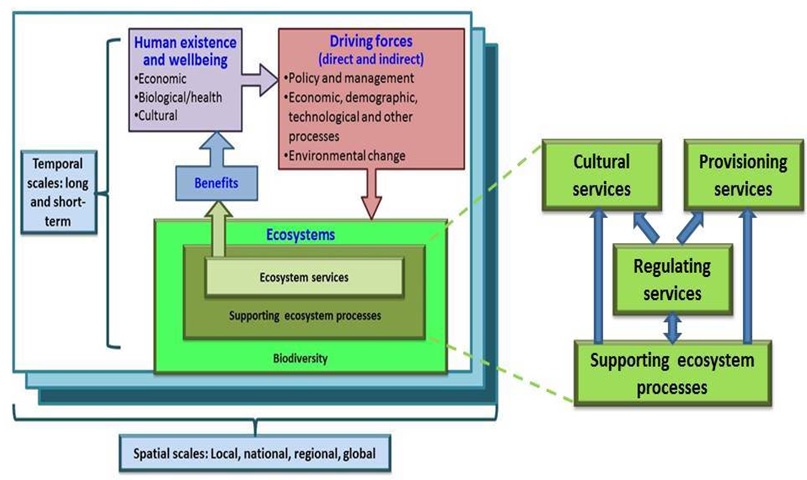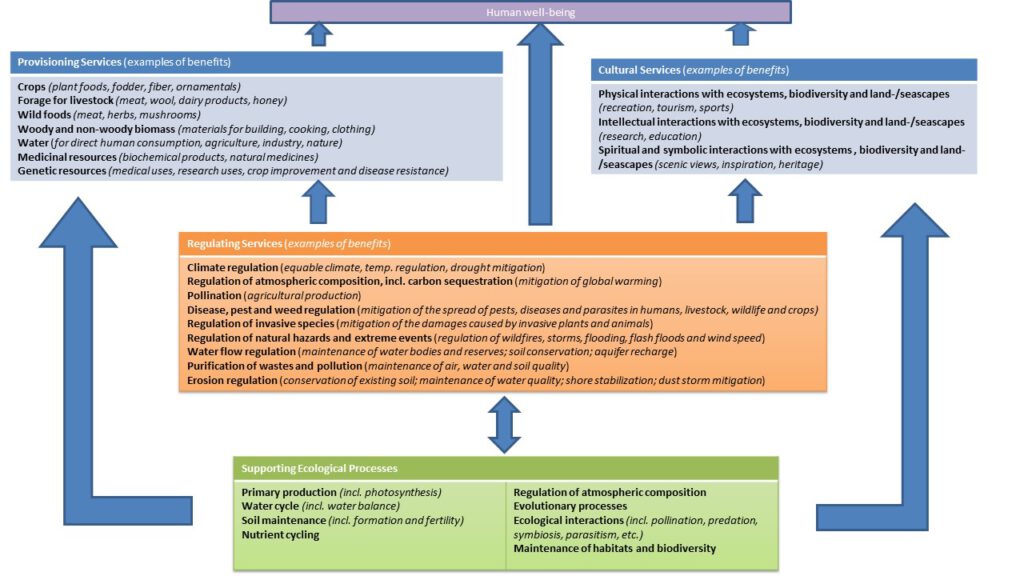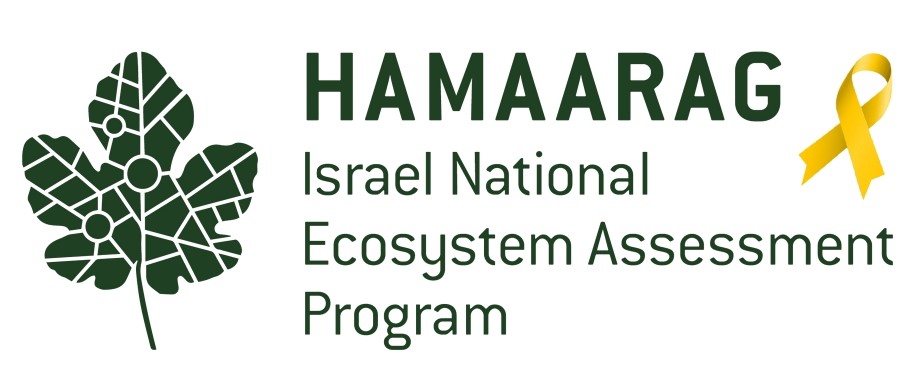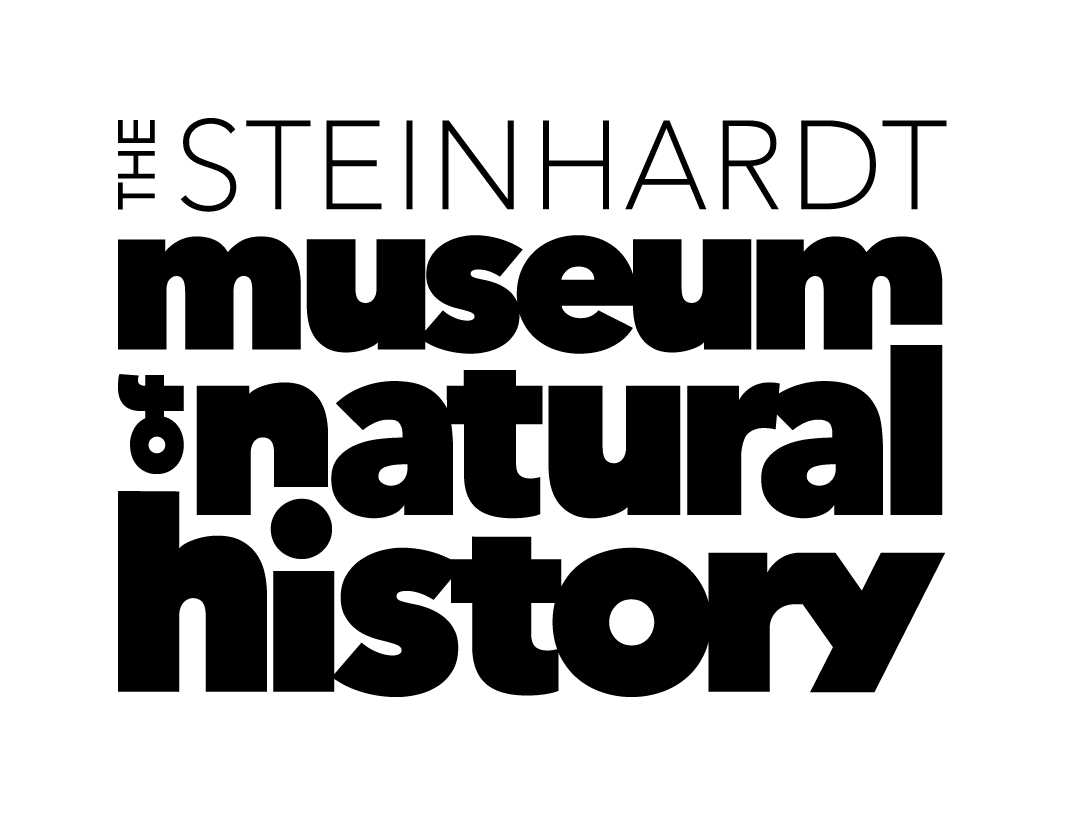This project aims to estimate the benefit that humans derive from Israel’s ecosystems and to ascribe a quantitative value to these benefits where possible. In this way, the project expresses the importance of functioning ecosystems, and of the biodiversity that supports them, to decision-makers. The project is based on the Millennium Ecosystem Assessment and similar projects that were conducted around the world, and is conducted in partnership with dozens of scientists and experts. The final product of this process is a comprehensive report that presents an up-to-date assessment of service provision and benefits from Israel’s various ecosystems.
In order to understand the term ecosystem services we will first define an ecosystem as: all of the plants, animals, microorganisms and environmental variables in a specific physical area. In other words: the biotic (living) and abiotic (inanimate) components of a given area, as well as the interactions and linkages between them. The components of an ecosystem exist within a complex web of interactions including energy flow and nutrient cycling. Examples of ecosystems include rainforests, woodlands, coral reefs, lakes, grasslands and deserts.
Ecosystem services, as defined in the Israel National Ecosystem Assessment (I-NEA) are the ecosystem processes and functions that are important for the existence and wellbeing of mankind.
A number of different types of ecosystem services are commonly defined:
- Provisioning services, which provide material products, such as water, building materials etc.
- Cultural services, such as landscape beauty, leisure and tourism, heritage, opportunities for education and research etc.
- Regulating services, such as climate regulation, flood prevention, erosion prevention, pollination etc.
The ecosystem services approach aims to estimate the benefit gained by mankind from our natural environment, as a way of expressing and quantifying the importance of healthy and functioning ecosystems and biodiversity in different ecosystems. To this end, a measurable value is applied to each of the services that ecosystems provide to mankind.
In recent years scientists, as well as decision makers who are active in open landscape management, have attached increasing importance to ecosystem services, due to heightened awareness of the dependence of social systems on ecosystems, and of the feedbacks between them.
The Israel National Ecosystem Assessment
At the end of 2012 the Board of Hamaarag decided to develop and conduct a National Ecosystem Assessment.
An “ecosystem assessment” is a project format that was first developed by an international and interdisciplinary group of scientists in the fields of natural and social sciences, under the name Millennium Ecosystem Assessment. The process summarized current knowledge on the state of, and trends within, ecosystems and the services they provide to mankind, on a global scale. Israel’s ecosystem assessment process does not aim to produce new primary knowledge, but rather to collect and synthesize existing knowledge, and to present information relevant for decision-making, planning and policy formulation regarding a publicly significant issue: the importance of the services that Israeli society receives from open landscapes, and quantification of their value.
The decision of HaMaarag to carry out a national ecosystem assessment project, which is called “Ecosystems and Human Wellbeing – A National Assessment” in Hebrew, stems from the recognition that the continuing existence and prosperity of human society depends on functioning ecosystems and the services they provide us. HaMaarag is also well aware of the significance of efficient and effective communication between open landscape managers and decision makers and the wider community when describing the importance and value (ecological, economic and cultural) of open landscapes, so that these issues will be taken into account during decision making. The first critical step in knowledge-based communication in this field is assessing and presenting the state of, and trends in, Israel’s ecosystems and the services they provide.
Goals of the I-NEA
The objectives guiding the project are:
- To increase awareness of the multifaceted value of nature and our dependence on functioning ecosystems.
- To assist managers, decision- and policy-makers in incorporating the value of ecosystem services and the biodiversity on which their provision depends into planning processes, land management.
Conceptual Framework
The conceptual framework presents the theoretical basis of the field of ecosystem services and their assessment in general, and the specific theoretical basis that was built for the Israeli project, including a schematic diagram. This chapter explains the rational for conducting the project, defines the central concepts, and describes important multidisciplinary aspects related to ecosystem services.

The conceptual framework diagram summarizes the project’s rationale in one picture, presenting the connections between the ecosystem and the social system, wherein ecosystems services and their benefits are a link that connects between environment and society. Among other things, the conceptual framework chapter details the list of services and benefits provided to society by the ecosystems in Israel that are included in the project, and defines the supporting ecological processes taking place in each one that enable provision of the different types of services.


